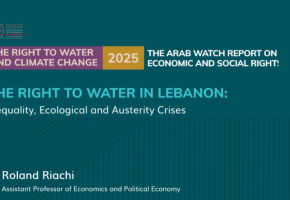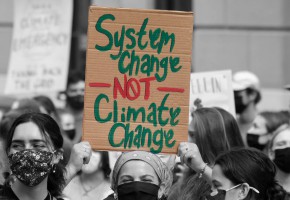
Struggling for Resilience: Yemen’s Battle Against Climate Change and Conflict – Sahar Mohammed
Struggling for Resilience: Yemen’s Battle Against Climate Change and Conflict – Sahar Mohammed
The impacts of climate change in Yemen became acutely evident following the massive flash floods during the summer of 2024. Harrowing images of vulnerable populations—especially women and children—unable to escape the floods captured the attention. These extreme weather events, spanning from April through August, affected multiple cities across Yemen, underscoring the increasing visibility of climate change impacts.
In 2023, the incidence of internal displacement due to climate extremes in Yemen tripled compared to the displacement caused by the conflict that began in 2014. The repercussions on livelihoods have been severe, particularly for agriculture, the primary source of income for over 37% of the Yemeni population. Preliminary assessments indicate the flash floods destroyed 98,726 hectares of agricultural land, including crops and orchards, and affected 279,400 livestock, primarily ruminants. More than 200,000 people have been directly impacted by this disaster.
The damage to irrigation infrastructure has been substantial, with irrigation channels and water storage facilities severely impaired, hindering recovery efforts. While extreme weather patterns have recurred almost annually, even more concerning are the less visible issues, such as severe water shortages. Yemen, already among the countries with the lowest water access globally, faces escalating water security challenges. For example, Aden is projected to face a severe drought, with an anticipated shortfall of 90 million cubic meters of water due to the depletion of underground wells in the Tuban Delta, the city's primary water source. This situation is aggravated by rising temperatures, changing rainfall patterns, and inadequate water management under weak governance.
Though climate change is a global issue, its effects are disproportionately burdensome for developing countries embroiled in prolonged conflicts. In Yemen, where nearly a decade of conflict has weakened infrastructure and governance, the impacts of climate extremes are particularly devastating. Compared to countries with resilient infrastructure and effective adaptation mechanisms, Yemen's limited capacity exacerbates the damage caused by climate shocks.
Despite its negligible contribution to global emissions, Yemen bears the brunt of climate change impacts. According to the Paris Agreement's principle of "common but differentiated responsibilities and respective capabilities," nations like Yemen are entitled to climate finance to aid their adaptation and mitigation efforts. While developed countries pledged $100 billion annually in climate finance, these commitments have not been fully realized.
Moreover, the current climate finance system is fraught with challenges. Experts criticize the lack of clarity and consistency in reporting methodologies, which allows donor countries to subjectively determine whether their contributions qualify as climate finance. Consequently, the most vulnerable nations receive only a fraction of the financial support they require.
In 2021, only 6.5% of total climate finance was allocated to the twenty most vulnerable countries. Yemen, along with conflict-affected countries in the MENA region, including Iraq and Syria, received merely 0.05% of global adaptation funds up to 2022. This highlights a significant shortfall in addressing the needs of those most affected by climate change.
Climate finance is primarily distributed through mechanisms such as the Green Climate Fund, Adaptation Fund, and bilateral agreements. However, Yemen faces limited access to these funds due to both systemic issues and internal governance challenges, including inadequate prioritization of climate resilience strategies.
Accessing climate funds differs from securing humanitarian or developmental aid; proposals must be evidence-based, demonstrating specific climate change impacts. This necessitates robust data collection and strategic planning, yet the ongoing conflict in Yemen has fragmented data collection efforts and undermined coordination within the country. Furthermore, Yemen's lack of accredited national institutions to receive funds further complicates access, as current funding is channeled through UN agencies, which are often criticized for bureaucratic inefficiencies.
The rapid onset of climate change impacts calls for swift action, yet existing funding mechanisms fall short of meeting these urgent needs. The approval and disbursement process for projects is often delayed by bureaucratic obstacles, posing significant challenges for countries like Yemen. Accelerating these processes and removing bureaucratic hurdles are crucial for enabling vulnerable nations to effectively respond to climate change challenges.
To improve access to climate funds, the Yemeni government must enhance its institutional capacity and governance. This involves establishing accredited national entities that can directly receive and manage climate finance. Strengthening data collection and analysis is crucial for creating evidence-based proposals that clearly articulate climate impacts and necessary interventions. Developing and implementing comprehensive Nationally Determined Contributions (NDCs) will further define clear adaptation and mitigation strategies. Through detailed studies assessing climate change impacts across various sectors, Yemen can build a robust foundation to guide strategic plans. By crafting holistic, evidence-based programs targeting critical areas, the government can effectively prioritize interventions.
Simultaneously, the private sector should play an active role in climate finance. Businesses can contribute significantly by investing in sustainable technologies and infrastructure, engaging in public-private partnerships, and offering innovative solutions for climate resilience. Incentivizing private sector involvement and fostering a supportive regulatory framework will enhance Yemen's overall capacity to tackle climate challenges.
Sahar Mohammed
Recent publications

The Right to Water in Lebanon: Inequality, Ecological and Austerity Crises - Roland Riachi
Related publications

An Alternative progressive cycle and a revitalized multilateral system - Roberto Bissio

